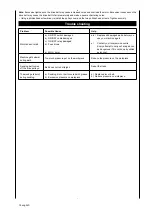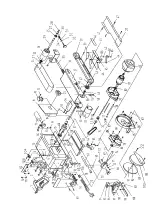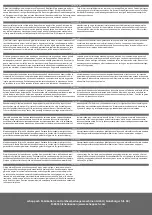
10 english
m
In these operating instructions we have
marked the places that have to do with your
safety with this sign.
m
General Safety Rules
m
Caution!
Read all safety regulations and instructions. Any
errors made in following the safety regulations and
instructions may result in an electric shock, fire and/
or serious injury. Keep all safety regulations and
instructions in a safe place for future use.
m
Warning!
To protect against electric shock, injury
and fire the following basic safety precautions must
be observed when using power tools.
Read and follow these instructions before using the
equipment and keep the safety information in a safe
place.
Safe work
1
Keep the work area orderly
–
Disorder in the work area can lead to accidents.
2
Take environmental influences into account
–
Do not expose electric tools to rain.
–
Do not use electric tools in a damp or wet environ-
ment.
–
Make sure that the work area is well-illuminated.
–
Do not use electric tools where there is a risk of
fire or explosion.
3
Protect yourself from electric shock
–
Avoid physical contact with earthed parts (e.g.
pipes, radiators, electric ranges, cooling units).
4
Keep children away
–
Do not allow other persons to touch the equipment
or cable, keep them away from your work area.
5
Securely store unused electric tools
–
Unused electric tools should be stored in a dry,
elevated or closed location out of the reach of
children.
6
Do not overload your electric tool
–
They work better and more safely in the specified
output range.
7
Use the correct electric tool
–
Do not use low-output electric tools for heavy
work.
–
Do not use the electric tool for purposes for
which it is not intended. For example, do not use
handheld circular saws for the cutting of branches
or logs.
–
Do not use the electric tool to cut firewood.
8
Wear suitable clothing
–
Do not wear wide clothing or jewellery, which can
become entangled in moving parts.
–
When working outdoors, anti-slip footwear is
recommended.
–
Tie long hair back in a hair net.
9
Use protective equipment
–
Wear protective goggles.
–
Wear a mask when carrying out dust-creating work.
10
Connect the dust extraction device
–
If connections for dust extraction and a collecting
device are present, make sure that they are con-
nected and used properly.
–
Operation in enclosed areas is only permitted
with a suitable extraction system.
11
Do not use the cable for purposes for which it is not
intended
–
Do not use the cable to pull the plug out of the outlet.
Protect the cable from heat, oil and sharp edges.
12
Secure the workpiece
–
Use the clamping devices or a vice to hold the
workpiece in place. In this manner, it is held more
securely than with your hand.
–
An additional support is necessary for long work-
pieces (table, trestle, etc.) in order to prevent the
machine from tipping over.
–
Always press the workpiece firmly against the
working plate and stop in order to prevent bounc-
ing and twisting of the workpiece.
13
Avoid abnormal posture
–
Make sure that you have secure footing and
always maintain your balance.
–
Avoid awkward hand positions in which a sudden
slip could cause one or both hands to come into
contact with the saw blade.
14
Take care of your tools
–
Keep cutting tools sharp and clean in order to be
able to work better and more safely.
–
Follow the instructions for lubrication and for tool
replacement.
–
Check the connection cable of the electric tool
regularly and have it replaced by a recognised
specialist when damaged.
–
Check extension cables regularly and replace
them when damaged.
–
Keep the handle dry, clean and free of oil and
grease.
15
Pull the plug out of the outlet
–
Never remove loose splinters, chips or jammed
wood pieces from the running saw blade.
–
During non-use of the electric tool or prior to
maintenance and when replacing tools such as
saw blades, bits, milling heads.
16
Do not leave a tool key inserted
–
Before switching on, make sure that keys and
adjusting tools are removed.
17
Avoid inadvertent starting
–
Make sure that the switch is switched off when
plugging the plug into an outlet.
18
Use extension cables for outdoors
–
Only use approved and appropriately identified
extension cables for use outdoors.
–
Only use cable reels in the unrolled state.
19
Remain attentive
–
Pay attention to what you are doing. Remain
sensible when working. Do not use the electric
tool when you are distracted.
20
Check the electric tool for potential damage
–
Protective devices and other parts must be care-
fully inspected to ensure that they are fault-free
and function as intended prior to continued use of
the electric tool.
–
Check whether the moving parts function fault-
lessly and do not jam or whether parts are dam-
aged. All parts must be correctly mounted and all
conditions must be fulfilled to ensure fault-free
operation of the electric tool.
–
Damaged protective devices and parts must be
properly repaired or replaced by a recognised
workshop, insofar as nothing different is specified
in the operating manual.






































